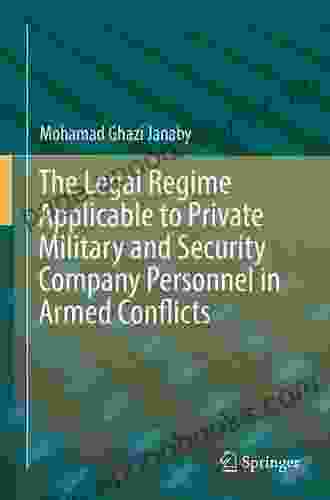The Legal Regime Applicable To Private Military And Security Company Personnel

Private military and security companies (PMSCs) have become increasingly common in recent years, providing a range of services to governments and other entities around the world. These services include security consulting, training, risk assessment, and armed protection. The use of PMSCs has raised a number of legal challenges and controversies, however, due to the complex legal regime that governs their activities.
5 out of 5
| Language | : | English |
| File size | : | 684 KB |
| Text-to-Speech | : | Enabled |
| Screen Reader | : | Supported |
| Enhanced typesetting | : | Enabled |
| Word Wise | : | Enabled |
| Print length | : | 485 pages |
The International Legal Framework
The international legal framework governing the use of PMSCs is complex and fragmented. There is no single treaty or convention that specifically addresses the issue of PMSCs. However, a number of international legal instruments are relevant to the use of PMSCs, including the Geneva Conventions, the International Covenant on Civil and Political Rights, and the United Nations Convention against Transnational Organized Crime. These instruments provide general principles of international law that can be applied to the use of PMSCs, such as the principle of distinction, the principle of proportionality, and the obligation to respect human rights.
Domestic Laws
In addition to the international legal framework, there are a number of domestic laws that regulate the use of PMSCs. These laws vary from country to country, but they typically include provisions on licensing, registration, and regulation of PMSCs. Some countries also have specific laws that govern the use of PMSCs in armed conflict. For example, the United States has the Private Security Contractor Reform Act of 2009, which regulates the use of PMSCs in Iraq and Afghanistan.
Industry Codes of Conduct
In addition to the international legal framework and domestic laws, there are a number of industry codes of conduct that have been developed to regulate the use of PMSCs. These codes of conduct are typically developed by industry associations and professional organizations. They provide guidance to PMSCs on how to operate in a responsible and ethical manner. For example, the International Code of Conduct for Private Security Providers was developed by the International Code of Conduct Association. This code of conduct sets out a number of principles that PMSCs should follow, such as the principle of respect for human rights, the principle of proportionality, and the principle of accountability.
Legal Challenges and Controversies
The use of PMSCs has raised a number of legal challenges and controversies. One of the most significant challenges is the issue of immunity from prosecution. PMSCs are often contracted by governments and other entities to provide security services in areas where there is armed conflict. In some cases, PMSCs have been accused of committing human rights abuses. However, PMSCs often claim that they are immune from prosecution because they are not государственными служащими. This issue has been the subject of a number of legal cases and debates.
Another challenge is the potential for human rights abuses by PMSCs. PMSCs are often armed and have the authority to use force. This raises the potential for human rights abuses, such as unlawful killings, torture, and arbitrary detention. PMSCs have been accused of committing human rights abuses in a number of countries, including Iraq, Afghanistan, and Colombia.
The legal regime applicable to private military and security company personnel is complex and fragmented. There is no single treaty or convention that specifically addresses the issue of PMSCs. However, a number of international legal instruments, domestic laws, and industry codes of conduct are relevant to the use of PMSCs. These instruments provide general principles of international law that can be applied to the use of PMSCs, such as the principle of distinction, the principle of proportionality, and the obligation to respect human rights. Despite the existence of these legal frameworks, the use of PMSCs has raised a number of legal challenges and controversies, such as the issue of immunity from prosecution and the potential for human rights abuses. These challenges and controversies are likely to continue as the use of PMSCs becomes more common.
5 out of 5
| Language | : | English |
| File size | : | 684 KB |
| Text-to-Speech | : | Enabled |
| Screen Reader | : | Supported |
| Enhanced typesetting | : | Enabled |
| Word Wise | : | Enabled |
| Print length | : | 485 pages |
Do you want to contribute by writing guest posts on this blog?
Please contact us and send us a resume of previous articles that you have written.
 Book
Book Novel
Novel Page
Page Chapter
Chapter Text
Text Story
Story Genre
Genre Reader
Reader Library
Library Paperback
Paperback E-book
E-book Magazine
Magazine Newspaper
Newspaper Paragraph
Paragraph Sentence
Sentence Bookmark
Bookmark Shelf
Shelf Glossary
Glossary Bibliography
Bibliography Foreword
Foreword Preface
Preface Synopsis
Synopsis Annotation
Annotation Footnote
Footnote Manuscript
Manuscript Scroll
Scroll Codex
Codex Tome
Tome Bestseller
Bestseller Classics
Classics Library card
Library card Narrative
Narrative Biography
Biography Autobiography
Autobiography Memoir
Memoir Reference
Reference Encyclopedia
Encyclopedia Verna Dreisbach
Verna Dreisbach Neela Arnaud
Neela Arnaud Paolo Menconi
Paolo Menconi Neil Faulkner
Neil Faulkner Matthew Whitaker
Matthew Whitaker Rita A Simmonds
Rita A Simmonds Scott Mariani
Scott Mariani Samuel Peralta
Samuel Peralta Steven A Mckay
Steven A Mckay Omar Lattouf
Omar Lattouf Rory August
Rory August Matthew Sullivan
Matthew Sullivan Richard Fox
Richard Fox Michael L Walden
Michael L Walden Paolo Javier
Paolo Javier Rodolfo Nunhez
Rodolfo Nunhez Michael Frewston
Michael Frewston Melvyn Dubofsky
Melvyn Dubofsky Molly Gloss
Molly Gloss Nanin
Nanin
Light bulbAdvertise smarter! Our strategic ad space ensures maximum exposure. Reserve your spot today!

 Leon FosterDive into the Gripping World of "Ve Got Your Number": A Literary Masterpiece...
Leon FosterDive into the Gripping World of "Ve Got Your Number": A Literary Masterpiece...
 Richard WrightUnveiling the Secrets of Eve's Diary: A Journey Through Mark Twain's Wit and...
Richard WrightUnveiling the Secrets of Eve's Diary: A Journey Through Mark Twain's Wit and... Carlos FuentesFollow ·6.6k
Carlos FuentesFollow ·6.6k Calvin FisherFollow ·10.5k
Calvin FisherFollow ·10.5k Ibrahim BlairFollow ·2.5k
Ibrahim BlairFollow ·2.5k Miguel NelsonFollow ·14.1k
Miguel NelsonFollow ·14.1k Alexander BlairFollow ·19.2k
Alexander BlairFollow ·19.2k Samuel WardFollow ·19.6k
Samuel WardFollow ·19.6k Julio CortázarFollow ·19.1k
Julio CortázarFollow ·19.1k Terry BellFollow ·17.3k
Terry BellFollow ·17.3k

 Ben Hayes
Ben HayesJourney into the Verdant Realm of "Plants vs. Zombies:...
Immerse Yourself in an Epic Battle for...

 Edward Reed
Edward ReedUnveiling the Allure of Modish Crochet Hats Annie...
In the realm of fashion and...

 Jaylen Mitchell
Jaylen MitchellHalf Moon Bay: An Unforgettable Adventure Awaits in Aj...
Prepare yourself...

 Dan Brown
Dan BrownUnleash the Plant-Powered Apocalypse: Dive into Paul...
Prepare yourself for an epic showdown where...

 Efrain Powell
Efrain PowellStolen Summer: Nora Sommer's Enthralling Caribbean...
Escape to a World of...

 Steven Hayes
Steven HayesPlants vs. Zombies: Lawnmageddon - The Ultimate Battle...
Prepare for the ultimate battle between plants...
5 out of 5
| Language | : | English |
| File size | : | 684 KB |
| Text-to-Speech | : | Enabled |
| Screen Reader | : | Supported |
| Enhanced typesetting | : | Enabled |
| Word Wise | : | Enabled |
| Print length | : | 485 pages |







